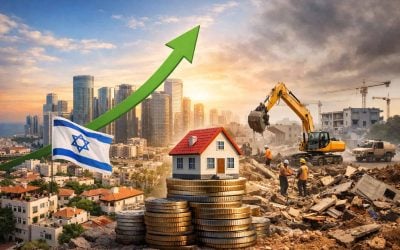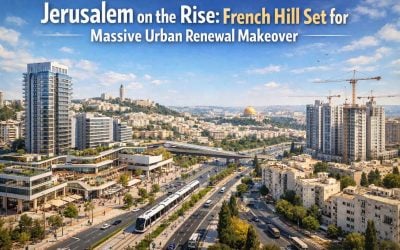March 25, 2025
Israel’s real estate sector continues to showcase impressive growth, driven by substantial investments, robust construction projects, and supportive government policies aimed at fostering economic resilience and national growth. From luxury real estate in Tel Aviv to innovative residential projects in peripheral regions, here’s a comprehensive overview of the latest developments.
Southern Israel Emerges as Real Estate Hotspot
Cities in Southern Israel, including Beersheba, Dimona, and Yeruham, have emerged as thriving markets, experiencing notable increases in property values. Beersheba, the capital of the Negev region, saw residential property values rise by around 16% during 2024. Dimona, a smaller city historically known for industrial activity, registered an impressive property appreciation of approximately 20%.
This surge is attributed to affordable land prices, intensified buyer interest, and government programs promoting regional development and population dispersal. Many investors, attracted by lower entry points and strong returns, view southern cities not only as profitable investments but as part of a larger national mission of strengthening the Negev region.
Luxury Properties Maintain Strength in Tel Aviv
Tel Aviv remains the heart of Israel’s luxury property market. Recently, an upscale penthouse in the prestigious Park Bavli neighborhood sold for approximately NIS 45 million. The luxury residence, covering roughly 370 square meters with an additional 140 square meters of terraces, exemplifies the continued allure of high-end real estate. With average costs surpassing NIS 105,000 per square meter, Tel Aviv’s luxury market continues to attract affluent buyers, both domestically and internationally.
Givatayim’s Iconic Residential Skyscraper Nearing Completion
The skyline of Givatayim is transforming as construction on the Hi Tower reaches its final stages. Set to become Israel’s tallest residential building, this 61-story tower rises approximately 228 meters. Scheduled to open later this year, the skyscraper includes around 285 residential units and offers upscale amenities such as a state-of-the-art fitness center, spa facilities, and advanced building technologies, reinforcing Givatayim’s appeal as an upscale suburb adjacent to Tel Aviv.
Major Commercial Investments Demonstrate Market Confidence
In Tel Aviv, major tech firm Check Point Software Technologies and prominent real estate developer Israel Canada jointly acquired prime real estate land valued around NIS 820 million. This substantial investment signals robust confidence in Tel Aviv’s long-term commercial and residential development potential, despite recent indications of market cooling.
Additionally, Eilat continues to attract wealthy buyers. An affluent investor from central Israel recently purchased a luxury six-bedroom villa near the Red Sea coast for roughly NIS 5.9 million. Transactions like these underscore sustained demand in resort cities, reinforcing Israel’s diversified real estate market appeal.
Jerusalem’s Visionary “Har Nof Slopes” Neighborhood Advances
In Jerusalem, progress continues on the transformative Har Nof Slopes project, where a consortium of leading developers—including Tadmor Group, Azorim, Abu, Aridar, and Mimushim—received initial planning approvals. This innovative residential quarter will span approximately 17 hectares, delivering around 1,950 residential units alongside extensive green spaces, schools, and public facilities. The project aims to rejuvenate Jerusalem’s western periphery by replacing outdated industrial sites with vibrant residential communities, representing hundreds of millions of shekels in strategic urban investment.
Massive Urban Renewal in Kiryat Gat to Revitalize Community
Kiryat Gat, located in southern Israel, has announced a significant urban renewal initiative (“Pinui-Binui”—Hebrew for evacuation and reconstruction). The project involves demolishing 20 aging apartment buildings comprising nearly 380 units, replacing them with approximately 2,800 modern apartments distributed across 37 new buildings. Led by government-backed housing company Amidar and private developers, the initiative represents a major investment aimed at revitalizing the northern area of Kiryat Gat, significantly improving housing conditions and attracting new residents.
Housing Market Trends: Stability Amid Changing Dynamics
Israel’s nationwide housing market has shown resilience despite signs of slowing transactions. In early 2025, real estate activity reached approximately 8,120 transactions in a single month—the highest monthly figure since late 2022. However, despite a rise in unsold new homes reaching nearly 79,000 units nationally, home prices remain stable and even slightly increasing, reflecting continued buyer demand, especially for newly constructed properties.
Analysts highlight that although the market is experiencing slower sales cycles, especially in the second-hand property segment, luxury properties and new developments are consistently strong, indicating a shift toward higher-quality, newly built homes.
Government Policies Target Stability, Fairness in Housing
Israel’s government introduced several policy measures affecting real estate:
Mortgage and Financing Regulations
The Bank of Israel announced tightened oversight on special financing plans offered by developers, aimed at reducing financial risks to buyers and banks. Under new guidelines, promotional schemes involving low initial payments or interest subsidies by developers will face restrictions, intending to prevent consumers from becoming overburdened by potentially unsustainable mortgage arrangements.
Increased Taxation on Investment Properties
To cool speculation, the Israeli government maintains an 8% purchase tax on secondary properties and introduced plans to increase the “Mas Hessef” (capital gains surtax) from 3% to 5%. These tax changes particularly impact investors owning multiple properties, aiming to stabilize the housing market and reduce speculative price inflation.
Controversial Housing Supply Legislation (“Arnona Fund” Bill)
The proposed Arnona Fund Bill seeks to compel local municipalities to facilitate annual construction quotas of approximately 5,200 residential units each, incentivized through state grants. Municipalities resisting these targets may lose access to vital state funding, sparking debate between local and national authorities over urban development control and infrastructure capabilities.
National Infrastructure Projects Set to Transform Real Estate Market
Israel’s real estate dynamics are also shaped by major infrastructure projects:
Rooftop Solar Energy Expansion
The government announced a national initiative aimed at installing solar energy panels on around 102,000 residential rooftops across Israel, offering attractive financial incentives. This sustainability drive promises homeowners reduced energy costs and increased home values, stimulating new business opportunities in solar installation and contributing to Israel’s renewable energy goals.
Port and Transportation Infrastructure Improvements
Significant regulatory reforms in Haifa and Ashdod ports promise to enhance maritime trade efficiency, boosting demand for nearby logistics centers and commercial warehouses. Additionally, infrastructure developments in major highways and continued progress in urban rail projects, such as the Tel Aviv Metro, promise improved connectivity, influencing residential and commercial property attractiveness.
A Strong, Diversified Market for Israel
Overall, Israel’s real estate sector in 2025 presents a dynamic landscape, balancing significant investments, transformative developments, and responsive government policy. Despite certain market segments experiencing slower transaction rates, the general trajectory remains positive, reflecting national economic strength and investor confidence. From burgeoning southern cities to elite Tel Aviv districts and visionary projects in Jerusalem and beyond, the Israeli property market continues to be a robust driver of economic growth and community development.




